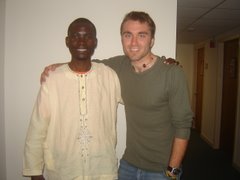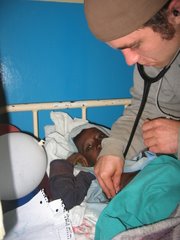
 Of late, most days in Kigali have been difficult, and the exceptions are few and far between. This is not a complaint or solicitation for sympathy, but simply a cross section of life that I want to share; for if this is what it’s like for me, you can imagine what it’s like for most Rwandese. Most of the difficulty is fueled from not having much money; spending five dollars per day renders my account bone dry before I get home. So sometimes I skip meals, but then am hungry and subject to depression. The other night I brought biscuits home and set them on a shelf. When I came back five minutes later they were gone. I asked my little brother how that could be and he told me, “Because you cannot own food – it’s to share”.
Of late, most days in Kigali have been difficult, and the exceptions are few and far between. This is not a complaint or solicitation for sympathy, but simply a cross section of life that I want to share; for if this is what it’s like for me, you can imagine what it’s like for most Rwandese. Most of the difficulty is fueled from not having much money; spending five dollars per day renders my account bone dry before I get home. So sometimes I skip meals, but then am hungry and subject to depression. The other night I brought biscuits home and set them on a shelf. When I came back five minutes later they were gone. I asked my little brother how that could be and he told me, “Because you cannot own food – it’s to share”.Being white and in Rwanda can be hard at times too. Last night I told this to my Rwandese friend, but she could not believe it. “Can that be true? No. In years past we were hostile to whites because they represented the non-intervening world, but Rwandans are much more friendly today”. So I told her stories. I told her about the guy two days ago who got off his motorcycle and introduced himself with a question and a biting tone: “Why do you come here and expect everyone to speak your language?” I was crushed, furious, and defensive. With a cold stare, I wanted to look at him and say, “well, you dumb ass, English is actually one of your country’s official languages”, but that would have been terribly foolish. So instead I responded in Kinyarwanda: “Beetay bjaway?” (How are you?) – then quickly added “Cheh cheh kah” (Shut up). It was a foolish and I’m not happy with myself, but I was hungry and frustrated and tired and – yeah, whatever, I cracked.
Yesterday I went to Gacaca (a community court that still hears cases and sentences killers from the 1994 genocide). Although the meetings are open to the public, throughout Gacaca eyes drilled through the back of my head. Afterwards a noticeably disturbed but friendly gentleman approached and greeted me in English. We talked for a while and he explained who everyone was, what was said, and how the court worked. On our side, three men in pink uniforms were getting into the back of an official-looking truck. “Those are the prisoners,” he said plainly. “Two of them are killers and one is a witness to their innocence, but he lies. The one there,” he pointed, “sitting in the middle – he was on trial today. He killed my mother”. At the moment, I am not sure how to hold that interaction.
I finally got home last night and collapsed on my bed - and lay there for probably two hours - exhausted, frustrated, defeated. Wanting more than anything to be understood. I pictured putting a USB adapter at the end of an IV so I could shovel my depleted state into words for you to understand. All sorts of tough questions swarmed through my head. Why am I here? Why did I give up the comforts of home? What am I supposed to do with all I see and experience? Then, without straining, an answer just kind of appeared. I came here to serve and not be served, because that’s what Jesus did, and he is my model. And then I remembered something about being part of the body of Christ, about setting aside the self, and how testing of faith develops perseverance. So I got
 up and went to the dining room, poured wine into a cup, tore off a piece of bread, and took communion. And at that moment, better than ever before, I understood what it meant to take the body “in remembrance of [him]”. Exhausted but not in despair.
up and went to the dining room, poured wine into a cup, tore off a piece of bread, and took communion. And at that moment, better than ever before, I understood what it meant to take the body “in remembrance of [him]”. Exhausted but not in despair.Picture to the left is of the church in Kicukiro (just up from where Shooting Dogs was filmed)



No comments:
Post a Comment